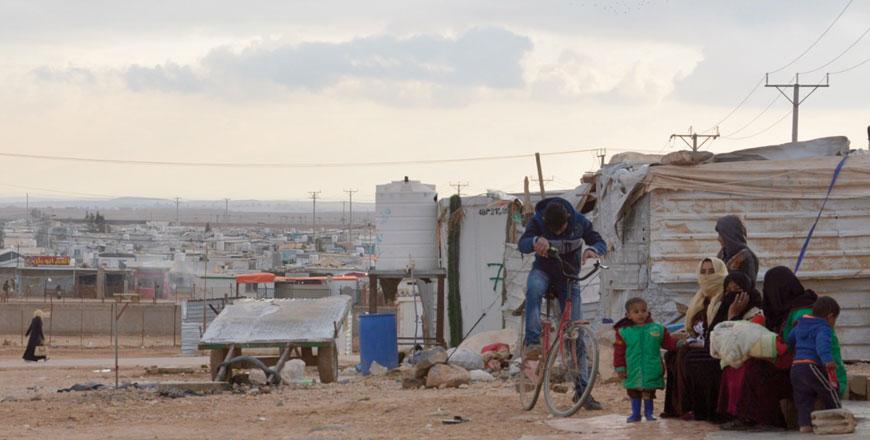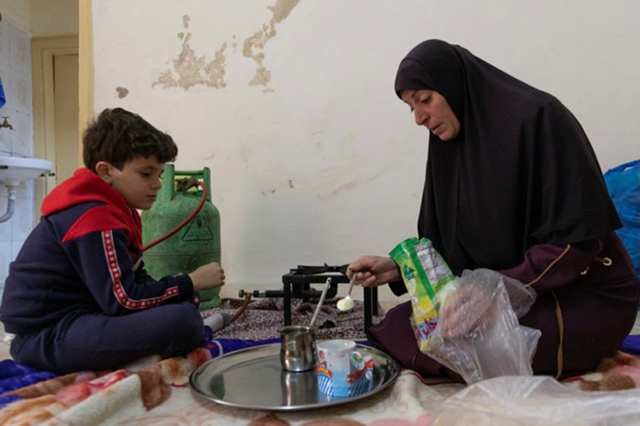You are here
UNHCR appeals for emergency funding for Syrian refugees
By Ana V. Ibáñez Prieto - Sep 16,2018 - Last updated at Sep 16,2018

UNHCR is in dire need for funds to spend on Syrian refugees (Photo by Amjad Ghsoun)
AMMAN — The UN Refugee Agency (UNHCR) on Monday appealed for $270 million in urgent funding, seeking to address the needs of internally displaced persons (IDPs) and Syrian refugees across the region for the remainder of 2018.
Emergency funding needs established by the UN agency in Jordan amounted to $70.1 million, UNHCR’s MENA region spokesperson, Rula Amin, told The Jordan Times.
Critical funding needs in the Kingdom included $23.7 million in cash-based interventions, $20 million in winterisation and $16.1 million in health services, according to Amin.
“UNHCR is increasingly troubled by a looming severe funding shortfall for our work with our partners in support of the millions of Syrian refugees and IDPs in Syria,” UNHCR spokesperson Babar Baloch said during a press briefing at the Palais des Nations in Geneva on Tuesday, warning that additional funds are “urgently needed in order to ensure that the most vulnerable among Syria’s refugees and IDPs do not go without vital protection and assistance this year”.
“The appealed [for] funds include the donations needed for critical preparations for the upcoming winter,” Baloch continued, as quoted in a statement, noting that “part of the urgent funding required both inside Syria and the refugee host countries will go towards putting in place UNHCR’s winterisation response, aiming to ensure that vulnerable families receive support well before the often harsh winter season starts”.
At least $196.5 million is needed to enable the UNHCR to continue its programmes through the rest of the year in Turkey, Lebanon, Jordan, Iraq and Egypt, the UN agency said in the press release, stressing that the programmes include cash assistance, protection, health and shelter activities.
“With over 5.6 million Syrian refugees registered across the region — including 2.6 million children, the needs of Syrian refugee families remain acute, with many of them not having the means to cover the basic essentials of life such as healthcare or education,” Baloch said.
A minimum of $44 million is needed in order to prevent the ceasing of cash activities in Jordan and Lebanon by November, the official warned, noting that the appealed funds would enable over 456,000 refugees to continue to pay rent, meet daily needs and maintain access to essential services like healthcare.
A striking 86 per cent of the Syrian refugees residing in Jordan are already living below the poverty line, according to a previous report issued by the UNHCR.
An additional $36 million is required in order to address the impact of rising healthcare costs in Jordan and Lebanon, which are placing some 35,000 vulnerable Syrian refugees at risk of not obtaining basic medical services such as child immunisations, according to a press release issued by the UN agency.
In late August, UN High Commissioner for Refugees, Filippo Grandi, called on the international community to provide adequate support to Jordan as it continues to provide services to Syrian refugees, highlighting the importance of relevant cooperation between the Kingdom and the UNHCR.
The remarks came during a meeting with Prime Minister Omar Razzaz, where the premier and the commissioner discussed means of cooperation towards meeting the needs of Syrian refugees.
Razzaz said that “Jordan has offered all it can to help Syrian refugees and will continue exerting efforts in this regard,” the Jordan News Agency, Petra, reported.
Minister of Planning Mary Kawar went over means to secure the funding necessary for the plans aimed at alleviating burdens of Syrian refugees, examining ways to find enough grants and soft loans to meet the necessary financing needs of the Kingdom’s budget over the next three years.
In May of this year, representatives of UN agencies operating in Jordan warned that the Kingdom had only received $215 million out of the $1.04 billion required for the full implementation of the Regional Refugee and Resilience Plan (3RP), aimed at assisting refugees and host communities with a range of humanitarian, protection and resilience programmes.
The announcement came during a joint press conference held by 3RP co-conveners the UNHCR and the UNDP, in cooperation with UNICEF and World Food Programme (WFP) representatives, who briefed the media on the “dire humanitarian consequences” of under-funding the Syria crisis response, and the challenges ahead in meeting the needs of refugees and vulnerable host communities.
Launched at the end of 2017, the 3RP plan requires a total of $5.6 billion in donations to respond to the needs of over 9 million Syrian refugees and vulnerable host communities across the Arab region.
“This is not a simple straightforward crisis and all agencies are in dire need of funds to continue doing their job,” the UNHCR Regional Director Amin Awad said, concluding that “the reason why we are here today is to convey our message to donors around the world to honour their commitments and pledges, and for host countries to sustain the presence of refugees”.
Inside Syria, $73 million is needed for core relief items, shelter, preparations for winter, livelihoods, protection and health, with costs of urgent winter support alone standing at $41.2 million.
“Hundreds of thousands of people have been displaced since the start of the year, and many rely on humanitarian support to meet basic daily needs,” Baloch said in this regard, noting that additional funding would allow the UNHCR to rapidly scale up activities across key sectors such as protection, shelter and the provision of basic aid, helping up to 1.8 million people.
UNHCR’s 2018 total financial requirements for the protection and assistance of Syrian refugees and IDPs stood at a total of $1.97 billion.
However, as of August 28, only $610 million had been received, satisfying only 31 per cent of the total financial requirements.
“The $270 million we are asking for in this emergency appeal represents only the most acute and pressing needs of Syrian refugees and IDPs within UNHCR’s overall unfunded requirements in 2018,” Baloch lamented in Geneva, expressing his appreciation for “the quick disbursement of existing pledges and commitments, as well as additional funding”.
Related Articles
AMMAN — Due to funding shortfalls, the United Nations High Commissioner for Refugees’ (UNHCR) winterisation response for 2022-2023 reached l
AMMAN — As winter approaches, the UN Refugee Agency (UNHCR) in Jordan has started the process of distributing one-off winter cash assistance
AMMAN — With an additional 20.4 million euros to UNHCR, the UN Refugee Agency, made available through a special-purpose contribution, German
















